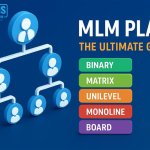Multi-Level Marketing (MLM) or direct-selling programs can offer several benefits, including
- Flexible Work Schedule: MLM programs often allow individuals to work on their own time, making it suitable for those looking for flexibility in their work schedule.
- Potential for High Earnings: Successful participants in MLM programs have the potential to earn significant income through commissions, bonuses, and incentives.
- Personal Development: MLM programs often provide training and support to help individuals improve their sales, marketing, and communication skills, leading to personal and professional growth.
- Networking Opportunities: MLM programs offer the chance to expand one’s network and build relationships with like-minded individuals, which can lead to new business opportunities and collaborations.
Ways of MLM multi-level marketing include
- Recruiting: Building a network of distributors or sales representatives who promote and sell products or services.
- Selling Products: Directly selling products or services to consumers and earning commissions on sales.
- Training and Support: Providing training, guidance, and support to downline distributors to help them succeed in their sales efforts.
Drawbacks of multi-level marketing (MLM) companies include
- High Failure Rate: Many participants in MLM programs do not achieve success and may end up losing money due to factors such as high competition, market saturation, and lack of support.
- Recruitment Focus: Some MLM companies prioritize recruiting new distributors over selling products, leading to concerns about the sustainability and legitimacy of the business model.
- Product Quality Concerns: In some cases, MLM companies may promote products of questionable quality or value, leading to customer dissatisfaction and reputational damage.
Signs that an MLM company might not be legitimate include
- Emphasis on Recruitment: If the company places more emphasis on recruiting new distributors rather than selling products or services to customers, it may be a sign of a pyramid scheme.
- Lack of Transparency: Legitimate MLM companies should provide clear information about their products, compensation plan, and business practices. If important details are withheld or unclear, it could indicate potential problems.
- Pressure to Invest: Be cautious if you feel pressured to invest a significant amount of money upfront or purchase large quantities of products without adequate information or justification.
Whether multi-level marketing (MLM) is good or bad depends on various factors, including individual preferences, goals, and experiences. While some people may find success and fulfillment in MLM programs, others may encounter challenges and disappointment. It’s essential to carefully research and evaluate any MLM opportunity before joining to ensure it aligns with your values and objectives.
Disadvantages of a multi-level marketing (MLM) company may include
- Financial Risk: Participants may incur expenses related to joining the program, purchasing products, attending events, and other business-related costs without guarantee of returns.
- Limited Control: Participants may have limited control over aspects such as product pricing, marketing strategies, and company policies, as these are typically determined by the MLM company.
- Reputational Risk: In some cases, association with an MLM company may lead to negative perceptions or stigma, particularly if the company has been involved in controversies or legal issues.










zpjnyg